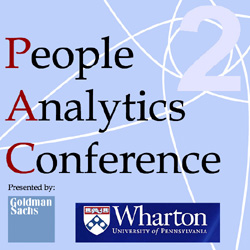in partnership with 
sponsored by  with support from
with support from 
Why you should participate
Have a real impact on the community
Year Up works to empower low-income young adults (ages 18-24) and to support them in transitioning from poverty to professional careers in just 12 months. Your work will help Year Up become an even more impactful organization as you help them tackle some of their biggest challenges in the field of people analytics, including things like:
- What are the best predictors of success in the program?
- How can Year Up support at-risk students?
- How can Year Up be more effective?
Showcase your skills in front of C-Suite executives
Case competition finalists will be presenting in front of a panel of judges which will consist of representatives from Year Up, experts in the field of people analytics from industry, as well as leading academics. The winner will present in front of our 400-person audience on the first day of the conference!
Win prize money!
First Place: $5,000
Second Place: $3,000
Third Place: $2,000
We will also reimburse all finalist teams for the cost of transportation to Philadelphia for up to $300 per person.
Competition Logistics
Teams of 3 students are eligible to compete. Students from any school or degree program are eligible (this is not exclusive to MBAs or to Wharton). After submitting the registration form and signing the NDA, student teams will be provided with a comprehensive data package including Excel files and descriptive PDFs.
February 20th (midnight EST) – Registration closes. Last date for teams to receive data package. To register please fill out the registration form and submit your consent to our non-disclosure agreement. Data will be provided within 48 hours of all forms being properly submitted.
February 28th (midnight EST) – Submissions due. Final submissions should include a memo summarizing your research and findings as well as a PowerPoint deck and be sent to casecomp@peopleanalyticsconference.com. The deck should be comprehensive in nature and ready to present if selected as a finalist. Note: the memo should be no more than 10 pages including exhibits and the case competition presentation should be no more than 15 minutes including following Q&A.
March 20th – Finalists announced. Finalists invited to attend the conference for free and to present their work to the panel of judges the day before the conference.
April 9th – Final team presentations to judges. Each team will present their final deck and be prepared to answer questions.
April 10th – The winning team is announced and allowed to present their findings on stage at the conference.
Registration
Registration is now closed. For any questions or concerns, please reach out to the case competition team at casecomp@peopleanalyticsconference.com.
Background Information on Year Up
We are pleased to announce our partnership with Year Up for this year's case competition. Year Up works to empower low-income young adults (ages 18-24) and support them in transitioning from poverty to professional careers in just 12 months. Founded in 2000, Year Up now operates in 11 cities around the country, and partners with over 400 top companies to provide internship and career opportunities for approximately 2,000 students per year. 85% of program graduates are employed or in college full time within 4 months of completing the program, and program graduates earn an average starting salary of over $35,000/year. For even more information on Year Up you can check out their website and YouTube channel.
Year Up provided us with detailed data on their young adult participants. This data ranges in time from their application to the program through their graduation and post-program employment and college outcomes. This year, we are challenging student teams to analyze Year Up's data and provide their most interesting findings and insights. We have included additional detail below to aid in your research.
The Case Challenge
This year, Wharton PAC is challenging students to utilize the comprehensive Year Up data provided to generate meaningful insights that the organization can use to create positive improvement in their current program. The Student ID or "PACE ID" field in each file uniquely identifies students; this will allow you to link the files together. Note that the data includes all past and current Year Up students from September 2010 - December 2014 – including alumni, active students, and dropouts. Be sure to filter by the appropriate group while completing your analysis. Additionally, students will often have more than one record per file. For example, the Employment file attempts to record all jobs and periods of unemployment for each student since graduation, resulting in multiple rows per student. Also, feel free to use outside research, data, or information to enhance your analysis.
Please choose ONE of the following prompts to address. Submissions will be evaluated based on the rigor and depth of the analysis, and the quality/feasibility of your recommendations to Year Up.
Our team is happy to assist you and answer any questions that might arise as you work on your case projects. Some data elements might not be immediately intuitive, so please do reach out with questions as you’re getting to know the data. Good luck analyzing!
Please choose ONE of the following prompts:
(Please note that the sub-questions are simply there to guide you. You should not feel constrained to conduct your analysis solely with these questions in mind)
- Are admissions ratings predictive of Year Up performance?
Look at admission data, self-reported demographics, as well as student data collected within the first few weeks of program launch. Pay close attention to the Attitude and Motivation ratings, which are new and currently unproven. Are any of these metrics related to student behavior and success throughout the program? Can any predictions be made about student dropout rates and the probability a student will achieve the goals of the program (i.e., at the completion of the program, successful students are identified as those enrolled in college courses and employed in a livable wage job)? What can be done to improve the predictive power of this information? Are there specific warning signs that should trigger interventions in the first few weeks of the program to aid in future student success? - What recommendations would you give to Year Up in order to better support at-risk students?
What can Year Up do to support at-risk students' success and increase their likelihood of achieving the program’s goals (i.e. at the completion of the program, successful students are identified as those enrolled in college courses and employed in a livable wage job)? For example, students facing more challenges in the readiness assessment tend to have a lower success rate. What types of students can bounce back from challenges? Are certain Year Up locations more successful at handling at-risk students than others? How impactful are Year Up's student services? Are these interventions important to student success? Can you quantify the team’s unique contribution to the success of students with high support needs? - What can Year Up do to increase their success rate?
Deep dive into the data to identify "bright spots." This could mean high performance, significant turnarounds, or successful career placements. What are the common characteristics or patterns between these cases? Deep dive into employment and higher education data. What types of students find jobs the fastest? Who is most likely to seek further education? Look at admissions, contract, and/or student retention data by city. What are the major differences in how the program is executed in each market? Do these differences impact success rates? What recommendations would you make to Year Up to help them make their program even more successful across locations?
Year Up's Solution and Data Collection
Student Admissions Process
Students interested in participating in Year Up must submit a comprehensive application. Year Up rigorously assesses applicants through group and individual interviews. The admissions committee looks for highly motivated, high-potential young adults who have been systematically disadvantaged. Year Up accepts two classes of students per year.
- Data Collection:
- The Engagement file includes self-reported demographic data as well as program information such as the Year Up location, cohort (month of graduation), and status (enrolled, fired, or alumni).
- The Readiness Assessment is administered by Year Up staff. The assessment rates prospective students’ strengths and challenge areas (lower numbers equate to fewer barriers). Note: On average, admitted students face challenges in 2-3 categories.
Onsite Learning
Admitted students participate in 21 weeks of classes on site at Year Up. Courses teach both hard and soft skills.
- Data Collection:
- The Contract Events file records the level at which students meet program expectations throughout the 21-week classroom period, including attendance and classroom behavior. Note: Each student starts the program with 200 points and gains or loses points based on attendance and behavior.
- The Social Work file includes case records from the Student Services team, who provide wraparound case management on issues like childcare, housing, legal aid, and transportation, to help students persist in the program. Each entry details the amount of time spent, issues discussed, and outside referrals made, if any.
6-Month Internship
Students are placed in a 6-month internship following their classroom instruction. Internship selections are based on a variety of factors including skills, personality, culture, and performance.
- Data Collection:
- The Internship file includes information on placement and position type.
- The Contract Events file records if students met program expectations during their 6-month internship, including attending classes at Year Up for a half-day each week.
- The Social Work file monitors student services (social worker) interaction during the internship period.
Graduation and Full-Time Employment
30%-40% of all students are hired directly out of their internship. Year Up aims to have 85% of all students placed in employment or full-time college within 4 months of graduation from the program.
- Data Collection:
- The Employment and Higher Education files summarize information that Year Up collects from their alumni, including all jobs and periods of unemployment experienced since graduation.
For Prospective Sponsors
Interested in partnering with us for next year's case competition? The Wharton People Analytics Conference aims to give you access to leading think-tanks from all over the world to help you solve your most challenging people analytics problems. When you partner with us:
- Our team works with you to construct a case study outlining a real problem you are currently facing in the field of people analytics
- You provide us with the relevant data, and we work with a team of trained students to fully anonymize the data and alleviate any privacy concerns
- Teams of 3-4 students from leading universities all over the world apply to participate in the case competition, and spend months working to solve your problem
- Submissions are evaluated by a panel of judges that consist of members from your organization and leading researchers and industry practitioners in the field of people analytics
- The top teams are invited to present their findings to this panel of judges on-site in Philadelphia
- The winning team presents their findings to all of our conference attendees during the conference
- You return to your organization with an innovative solution to one of your most challenging problems without having to hire outside consultants
For any questions or concerns, please reach out to Rachel Krall at rakrall@wharton.upenn.edu.



